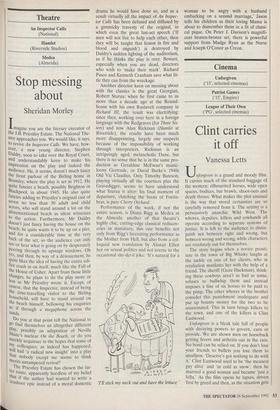Theatre
An Inspector Calls (National) Hamlet (Riverside Studios) Medea (Almeida)
Stop messing about
Sheridan Morley
Imagine you are the literary executor of the J.B. Priestley Estate. The National The- atre approaches you. We would like, it says, to revive An Inspector Calls. We have, how- ever, a new young director, Stephen Daldry, soon to take over the Royal Court, and understandably keen to make his Impression on the play and indeed the audience. He, it seems, doesn't much fancy the front parlour of the Birling home in Bromley, where the play is set in 1912. He quite fancies a beach, possibly Brighton or Blackpool, in about 1945. He also quite fancies adding to Priestley's original cast of seven no less than 30 adult and child actors, who will stand around a lot on the aforementioned beach as silent witnesses to the action. Furthermore, Mr Daldry doesn't just fancy having the house on the beach; he quite wants it to be up on a pier, and for a considerable time at the very back of the set, so the audience can only see or hear what is going on by desperately Peering through its upstage windows. Oh Yes, and then, by way of a denouement, he quite likes the idea of having the entire edi- fice crash in on itself, much like the Fall of the House of Usher. Apart from those little Changes, he plans to do the play more or less as Mr Priestley wrote it. Except, of course, that the Inspector, instead of being the time-travelling visitor to the Birling household, will have to stand around on the beach himself, bellowing his enquiries as if through a megaphone across the sands.
Do you at that point tell the National to go find themselves an altogether different Play, possibly an adaptation of Neville Shute's nuclear On the Beach, or do you meekly acquiesce in the hopes that some of my colleagues, as indeed has happened, will hail 'a radical new insight' into a play that nobody except me seems to think merits untampered revival? The Priestley Estate has chosen the lat- ter route, apparently heedless of my belief that if the author had wanted to write a seashore epic instead of a moral domestic drama he would have done so, and as a result virtually all the impact of An Inspec- tor Calls has been defused and diffused by
a gimmicky travesty of the original, in which even the great last-act speech ('If men will not live to help each other, then they will be taught that lesson in fire and blood and anguish') is destroyed by Daldry's sudden lighting of the auditorium, as if he thinks the play is over. Beware, especially when you are dead, directors who wish to 'make their mark'. Richard Pasco and Kenneth Cranham save what lit- tle they can from the wreckage.
Another director keen on messing about with the classics is the great Georgian, Robert Sturua: when he first came to us more than a decade ago at the Round- house with his own Rustaveli company in Richard III, the result was electrifying: since then, working over here in a foreign language with the Redgraves (for Three Sis- ters) and now Alan Rickman (Hamlet at Riverside), the results have been much more disappointing, largely one suspects because of the impossibility of working through interpreters. Rickman is an intriguingly aged, melancholic Dane, but there is no sense that he is in the same pro- duction as Geraldine McEwan's manic- loony Gertrude, or David Burke's 1940s Old Vic Claudius. Only Timothy Bateson, playing virtually all the courtiers plus the Gravedigger, seems to have understood what Sturua is after: his final moment of departure, clutching the boots of Fortin- bras, is pure Cherry Orchard.
Performance of the week, if not the entire season, is Diana Rigg as Medea at the Almeida: another of that theatre's highly chic, cutting-edge classical rediscov- eries in miniature, this one benefits not only from Rigg's lacerating performance as the Mother from Hell, but also from a col- loquial new translation by Alistair Elliot hot on sexual politics and not averse to the occasional she-devil joke: 'It's natural for a
`I'll stick my neck out and have the lettuce.'
woman to be angry with a husband embarking on a second marriage,' Jason tells his children as their loving Mama is about to dismember them in a fit of classi- cal pique. On Peter J. Davison's magnifi- cent beaten-bronze set, there is powerful support from Madge Ryan as the Nurse and Joseph O'Conor as Creon.


































































 Previous page
Previous page